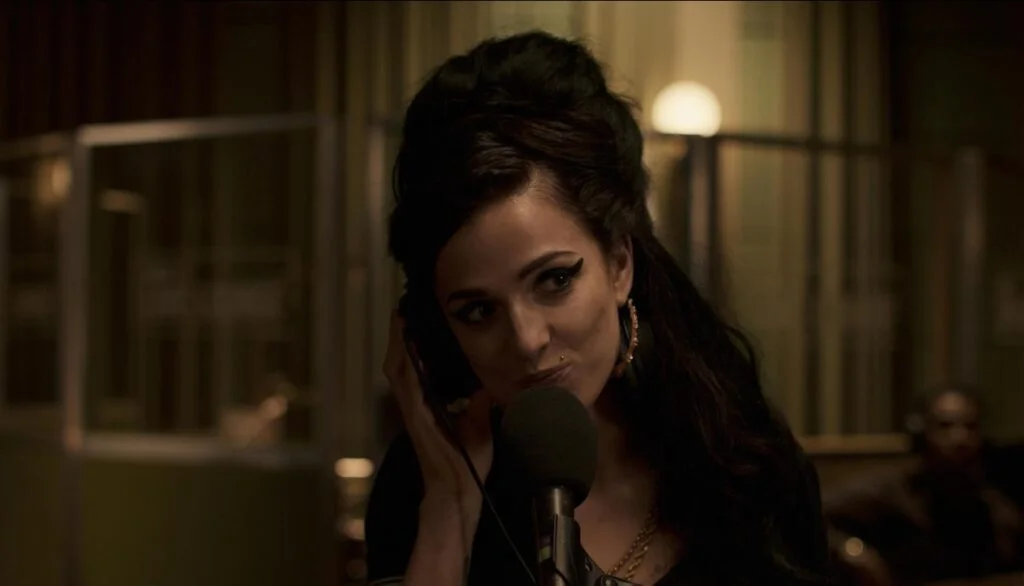Back to Black Movie Story :-
Centered on the life of Amy Winehouse, the Grammy-winning British singer and songwriter, this film chronicles her journey from the early days of her musical career in early 2000s North London as a jazz musician to the pinnacle of her fame with hit songs like “Rehab” and “Back to Black.”
Back to Black Release Date, Trailer, Songs, Cast
| Release Date | 17 May 2024 |
| Language | Hindi |
| Genre | Biography, Drama |
| Duration | 2h 2min |
| Cast | Marisa Abela, Jack O’Connell, Eddie Marsan, Juliet Cowan, Lesley Manville, Ansu Kabia, Bronson Webb, Harley Bird, Sam Buchanan, Pierre Bergman, Colin Mace, Tim Treloar |
| Director | Sam Taylor-Johnson |
| Writer | Matt Greenhalgh |
| Cinematography | Polly Morgan |
| Music | Warren Ellis, Nick Cave |
| Producer | Alison Owen, Debra Hayward |
| Production | Monumental Pictures, StudioCanal, Focus Features |
| Certificate | 16+ |
Back to Black Movie Review :-
Sam Taylor-Johnson’s portrayal of the jazz-meets-rock-star drama is undeniably intriguing, though its portrayal of a dysfunctional-addict love story keeps viewers somewhat distant.
Titled after Amy Winehouse’s iconic 2006 album, “Back to Black,” this biopic delves into the exquisite contradiction inherent in Winehouse’s music. While her songs exude a retro bop bounce, her lyrics delve into dark, introspective themes. “Rehab,” a standout track, encapsulates this duality with its upbeat rhythm masking the somber subject matter of addiction.
The film’s strength lies in its exploration of this light/dark balance, as it delves into the complexities of Winehouse’s life. Marisa Abela’s portrayal of Winehouse captures every facet of the singer’s persona, from her highs to her lows. Despite initial skepticism about the casting, Abela’s performance proves to be a tour de force, authentically embodying Winehouse’s tumultuous journey. This authenticity is further reinforced by the film’s connection to the acclaimed documentary “Amy” (2015), which laid the groundwork for the resurgence of interest in Winehouse’s life and career.
We first encounter Amy during her early years, a time characterized by her rebellious spirit and emerging sense of identity. With a pierced upper lip and a yet-to-be-discovered iconic style, she navigates her Jewish upbringing in London’s Camden district. Despite her attachment to her Nan Cynthia, a former nightclub singer, Amy defies the expectations of being a conventional “nice Jewish girl.” Instead, she exudes a bold, insouciant demeanor, marked by a hunger for life and a distinct working-class accent that underscores her authenticity.
Set in 2002, the film portrays Amy as a rising star in London’s nightclub circuit. During a family gathering at her father Mitch’s house, where she resides due to her parents’ separation, Amy and Mitch share a heartfelt duet of “Fly Me to the Moon.” This intimate moment reveals Amy’s innate talent and passion for music, laying the foundation for her future success as a singer.
The edgy side of Amy’s persona is unmistakably present. In a moment that elicits both laughter and underscores her boundary-pushing nature, Amy catches the attention of potential manager Nick Shymansky when she performs “Stronger Than Me,” a song that openly criticizes her boyfriend as weak (leading to an awkward confrontation between Nick and the boyfriend). Despite claiming she’s not a feminist because she enjoys male company, Amy embodies a new form of feminine empowerment—a rebellious jazz diva reminiscent of Courtney Love, unapologetically embracing hedonistic self-expression. Her feminism lies in her defiance of societal norms, whether in her drinking habits, impulsive tattoos (far more provocative years ago), or bold emulation of her jazz idols. “I’m no Spice Girl,” she asserts to Nick, a statement that rings true as she continues to challenge conventions, consequences be damned.
Amy’s debut album, “Frank” (2003), intentionally defies commercial trends with its retro jazz vibe, a nod to her idol Frank Sinatra (though the film doesn’t explicitly mention this). Despite her insistence on artistic integrity over financial gain, navigating the music industry proves challenging. Executives push for changes due to the album’s lack of commercial appeal, suggesting delaying its U.S. release and discontinuing her guitar performances onstage. Amy’s response? A defiant refusal to compromise, asserting her need for life experiences to fuel her songwriting before embarking on her next album.
Living life to the fullest leads Amy to encounter Blake Fielder-Civil, who becomes her passionate, addictive love interest. Their meeting at a pub unfolds as a seductive dance of mutual attraction, expertly crafted by director Sam Taylor-Johnson. Blake exudes confidence bordering on toxicity, embodying a retro British charm akin to late-’60s matinee idols. However, their relationship is marked by mutual addiction and narcissism, with Blake’s substance abuse exacerbating their tumultuous dynamic. Despite their intense chemistry, their connection is fraught with aggression, hinting at a tumultuous future ahead.
This poses a significant narrative challenge for the film. Amy’s album “Back to Black” emerges from the devastation left by Blake, yet the movie offers scant insight into the creation of Winehouse’s seminal second and final album. While the title track is recorded, the process remains largely unexplored, with only passing mentions of producers Mark Ronson and Salaam Remi. Despite the album’s commercial success catapulting Amy into celebrity status, Blake interprets its melancholic themes as a sign of reconciliation, leading to a hasty marriage and subsequent breakup.
Unlike “Sid and Nancy,” the film fails to evoke the intoxicating allure of dysfunctional passion, instead presenting a detached portrayal of tumultuous love. Without a clear villain to blame for Winehouse’s descent into alcoholism, the film’s depiction of her self-sabotage feels clinical rather than poignant. Although Abela’s performances of Winehouse’s classics capture their essence with haunting beauty, the sporadic inclusion of these songs lacks the emotional resonance necessary for catharsis.
Despite entering rehab later in life, paralleling Janis Joplin’s trajectory, Amy joins the tragic ranks of pop stars who died at 27. Her self-destructive tendencies, vividly portrayed in “Back to Black,” are depicted without a deep understanding, leaving the audience without a sense of closure or insight into her turmoil.
Back to Black is now streaming on Netflix!
Also Read the Movie Review:- Thelma the Unicorn 2024 Release Date, Trailer, Songs, Cast




